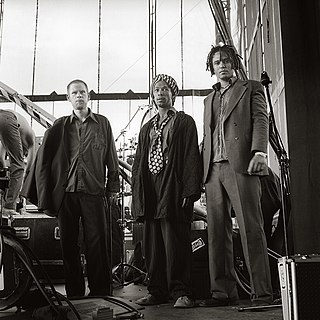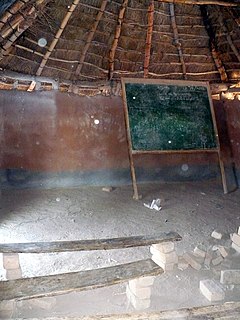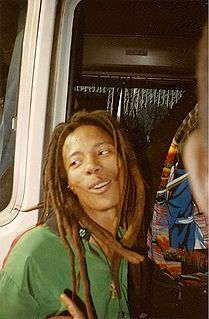"Washington Bullets" is a song from The Clash's 1980 album Sandinista!. A politically charged song, it is a simplified version of imperialist history from the 1959 Cuban Revolution to the Nicaraguan Sandinistas of the 1980s, with mention of the Bay of Pigs Invasion, the Dalai Lama, and Víctor Jara, referencing his death at the hands of the Chilean military dictatorship in the stadium that now bears his name. Although a criticism of the foreign policy of the United States, the song's final stanza also delivers a criticism of Communist states by making reference to the treatment of pacifist Buddhist monks in the People's Republic of China during the Cultural Revolution and the Soviet Union's Invasion of Afghanistan.
Steel Pulse is a roots reggae musical band from the Handsworth area of Birmingham, England, which has a large number of Afro-Caribbean, Indian and other Asian migrants. They originally formed at Handsworth Wood Boys School - composed of David Hinds, Basil Gabbidon, and Ronald McQueen (bass); along with Basil's brother Colin briefly on drums and Michael Riley. Steel Pulse were the first non-Jamaican act to win the Grammy Award for Best Reggae Album.

Seeed is a German hip hop, reggae and dancehall band based in Berlin. Founded in 1998, they have become well known in Germany and its neighboring countries.

Bob Marley and the Wailers were a Jamaican reggae band led by Bob Marley. It developed from the earlier ska vocal group, the Wailers, created by Marley with Peter Tosh and Bunny Wailer in 1963. By late 1963 singers Junior Braithwaite, Beverley Kelso, and Cherry Smith had joined on. By the early 1970s, Marley and Bunny Wailer had learned to play some instruments and brothers Aston "Family Man" Barrett (bass) and Carlton Barrett (drums), had joined the band. After Bunny Wailer and Peter Tosh left the band in 1974, Marley began touring with new band members. His new backing band included the Barrett brothers, Junior Marvin and Al Anderson on lead guitar, Tyrone Downie and Earl "Wya" Lindo on keyboards, and Alvin "Seeco" Patterson on percussion. The "I Threes", consisting of Judy Mowatt, Marcia Griffiths, and Marley's wife, Rita, provided backing vocals.

Dennis Emmanuel Brown CD was a Jamaican reggae singer. During his prolific career, which began in the late 1960s when he was aged eleven, he recorded more than 75 albums and was one of the major stars of lovers rock, a subgenre of reggae. Bob Marley cited Brown as his favourite singer, dubbing him "The Crown Prince of Reggae", and Brown would prove influential on future generations of reggae singers.

Lower education in Zambia is divided into three levels; primary, junior, secondary and upper secondary. Higher education in Zambia has improved in the recent years due to the increase of private universities and colleges. The biggest university is the public University of Zambia, which is located in the capital Lusaka. Then there are many other smaller universities, some public others private including Copperbelt University, Zambia Open University, European University Zambia Zambia Catholic University, Cavendish University, Zambia Adventist University, Northrise University, University of Lusaka, Lusaka Apex Medical University, Woodlands University College, Copperstone University College, University of Africa, Information and Communication University, Mulungushi University, Kwame Nkrumah University of Education and there are various Health training Institutes offering Diplomas in clinical medicine, Registered Nursing.
Ras Sheehama is a Namibian reggae musician. The political pro-SWAPO stance of his father forced him into exile in 1979 to Angola and Zambia. There he started to develop his love for the reggae-music and begin to play guitar. In Zambia for the first time he got in contact with the Rastafari and Reggae culture. During the time at a highschool in Lagos, Nigeria between 84 and 88 he played in several Reggaebands. When he returned home in 1990 to witness the first free elections in his home country, he brought huge experiences to Namibia.
Reggae is a music genre that originated in Jamaica in the late 1960s. Australia has several bands and sound systems that play reggae music in a style faithful to its expression in Jamaica. Australia has a relatively small Jamaican community, but reggae penetrated local consciousness via the popularity of reggae among the non-Jamaican population of England in the 1960s and 1970s. Many indigenous musicians have embraced reggae, both for its musical qualities and its ethos of resistance. Examples include No Fixed Address and Coloured Stone.

The Poor People's Alliance is a network of radical grassroots movements in South Africa. It was formed in 2008 after the Action Alliance, formed in December 2006, was expanded to include two more organisations.

mad President is a Reggae album by Maiko Zulu. The album was produced in 2006 with the hit song Mad president. Zambian owned state media, ZNBC refused to play the song. The song Mad president talks of a tyranny president, who thinks he the judge, policeman, prosecutor, he hires and dismiss staff whenever he feel like
In the Ghetto is a Reggae album by Maiko Zulu. The album was produced in 2001 with the hit song In The Ghetto.
Pressure is a Reggae album by Maiko Zulu. The album was produced in 2003 with the hit song pressure.
In the Ghetto is a song written by Mac Davis and popularized by Elvis Presley.
Bambata is a music project in South Africa which has produced three popular albums, 1906 in 2000, ukhandampondo in 2002, and Abashokobezi 1906–2006 in 2006.

Zone Fam is a Zambian hip hop group based in Lusaka, composed of Sam Sakala, Jackson Banda, Reginald Lube, and previously Tim Chisenga until his departure from the group on April 1, 2015.The group was formed in 2009 after they were all signed to Slam Dunk Records. They gained popularity after the release of their debut album single Shaka Zulu On Em which received nationwide airplay, topping radio charts and got worldwide reviews off YouTube. In 2011 they went on and released their first studio album, The Business: Foreign Exchange, which was best seller of that year. In 2012, Zone Fam signed their first international deal under record label Taurus Musik of Kenya, which helped them produce songs from their upcoming album Barcode namely, Translate and Contolola, which won them a Channel O Award at the Channel O Music Video Awards for Best Group. They also have to their name the award for Best African Group at the Global African Music Awards.
Siame O'Brien, better known by his stage names OC Osilliation or OC, is a recording artist and producer from Lusaka, Zambia. He is also the CEO of recording studio Obama Records and Entertainment; which has produced four studio albums. OC has also released several top selling singles, including "Folo Folo", " Wangu ni Wangu", "Wacha Wachema", "Rafiki", and "Last Forever" which continue to be fan favorites and most requested.

Likando Kalaluka, State Counsel, is a Zambian legal practitioner who is currently serving as Attorney General under the government headed by President Edgar Lungu. He is a lawyer and advocate of the High Court for Zambia. Kalaluka is currently serving as the Zambia Institute of Advanced Legal Education (ZIALE) board chairman. As Attorney General, Kalaluka is an ex-officio cabinet member and principal legal adviser to the Zambian Government.
Anthony Mbinga Kafunya, known professionally as Daddy Zemus, was a Zambian musician and songwriter. Hailed as the King of Zam-ragga, he was one of the first artists to fuse local music with ragga, hip-hop and R&B, and is widely regarded as a pioneer in this form of Zambian music. After signing with the fledgling record label Mondo Music, Zemus released the chart topping album Chibaba in December 1999 to critical acclaim, and it turned out to be one of the most influential albums in Zambian music history, as it heralded the new wave of Zambian sound and inspired several other upcoming Zambian musicians.










